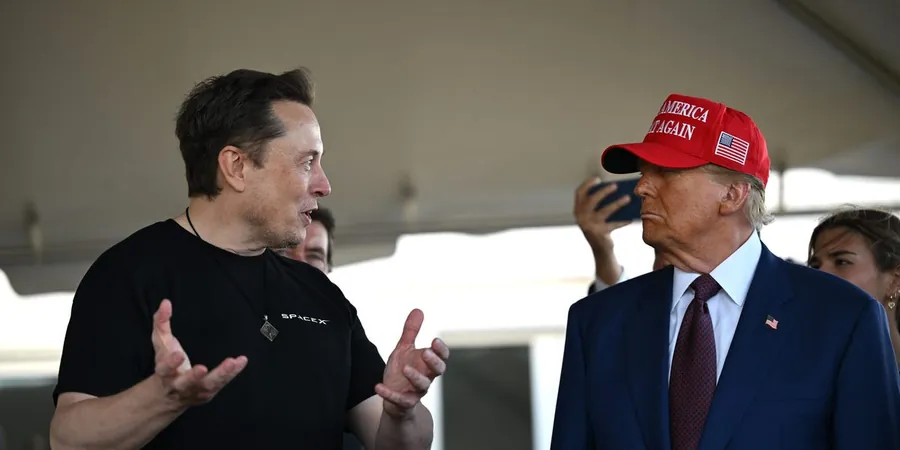
Elon Musk Takes a Stand Against Trump’s Tariffs: A Growing Divide?
2025-04-08
Author: Yan
In an unexpected turn of events, Elon Musk, the world’s wealthiest individual and a long-time supporter of former President Donald Trump, has voiced his discontent with the latest tariffs imposed by the Trump administration. This rift signals a significant shift in Musk's stance on trade policies that have rattled global markets.
During a recent meeting with Italian politicians, Musk criticized Trump’s "reciprocal" tariffs, advocating instead for a “zero-tariff system” between Europe and the United States. His comments highlight a clear alignment with free trade principles, a perspective he reinforced when he engaged in a public debate with Peter Navarro, Trump's chief trade advisor.
Reports indicate that Musk made a direct appeal to Trump over the weekend, urging him to reconsider the sweeping tariff measures. However, it seems his plea fell on deaf ears, as Trump doubled down on his tariff strategy. As global markets continued to struggle amidst these developments, Musk shared a video featuring renowned economist Milton Friedman, further advocating for the benefits of free trade.
Historically, Musk has expressed opposition to tariffs, even those that might seem to benefit his business interests. Last year, he publicly criticized President Biden's aggressive tariff strategy against Chinese electric vehicle manufacturers, indicating that he favors an open market.
The implications of Trump’s tariffs are particularly significant for Tesla. Although the electric vehicle maker is better equipped than many competitors to withstand the 25% tax on imported vehicles, rising costs for parts manufactured abroad remain a pressing concern. With approximately 25% of the components for Tesla's Model Y sourced from outside the U.S., Musk has warned that the impact on the company's bottom line will be substantial.
As a result of the escalating tariff crisis, Tesla's stock has experienced a drastic decline, plummeting over 11% in just five days, and has dipped 38% in value since the beginning of the year. This downturn has pushed Musk's net worth below the $300 billion mark for the first time since November.
The ongoing trade tensions between the U.S. and China introduce another layer of risk for Tesla. Given that China is Musk's second-largest market and home to one of Tesla's significant gigafactories, potential retaliatory measures from the Chinese government could severely affect Tesla's operations. Analysts suggest that the deepening trade rift could lead Chinese consumers to favor domestic electric vehicle brands, like BYD and Nio, over Tesla, potentially harming the brand's standing in one of its most critical markets.
With sales declining globally and increasing competition from local rivals, Musk faces a perfect storm of challenges exacerbated by Trump’s tariff policies. As the business landscape continues to evolve, Musk’s relationship with Trump, once seen as a strong alliance, now appears to be fraying under the pressure of trade disputes. Is this the beginning of a significant shift in political alliances for the billionaire entrepreneur? Only time will tell, but stakeholders will be watching closely as these macroeconomic factors unfold.




 Brasil (PT)
Brasil (PT)
 Canada (EN)
Canada (EN)
 Chile (ES)
Chile (ES)
 Česko (CS)
Česko (CS)
 대한민국 (KO)
대한민국 (KO)
 España (ES)
España (ES)
 France (FR)
France (FR)
 Hong Kong (EN)
Hong Kong (EN)
 Italia (IT)
Italia (IT)
 日本 (JA)
日本 (JA)
 Magyarország (HU)
Magyarország (HU)
 Norge (NO)
Norge (NO)
 Polska (PL)
Polska (PL)
 Schweiz (DE)
Schweiz (DE)
 Singapore (EN)
Singapore (EN)
 Sverige (SV)
Sverige (SV)
 Suomi (FI)
Suomi (FI)
 Türkiye (TR)
Türkiye (TR)
 الإمارات العربية المتحدة (AR)
الإمارات العربية المتحدة (AR)